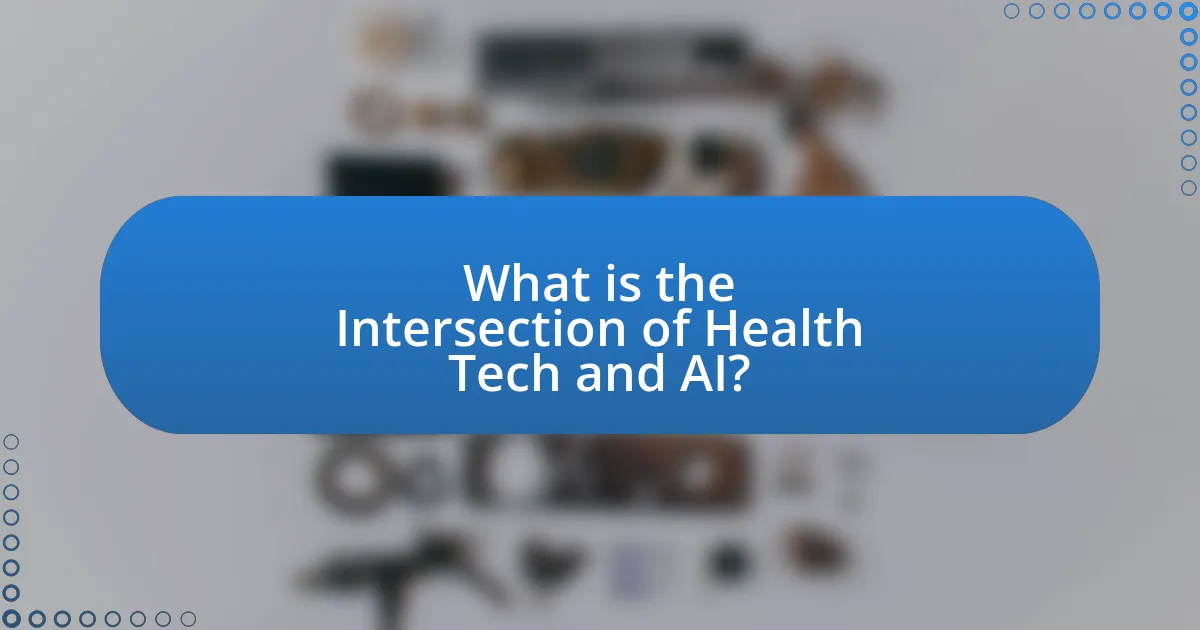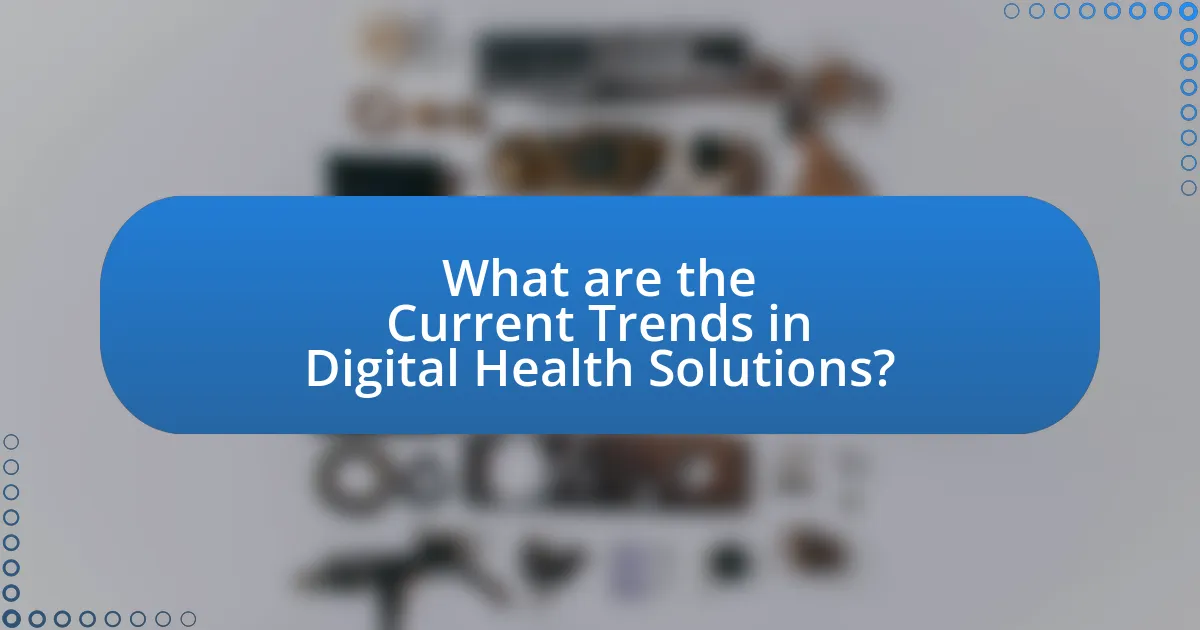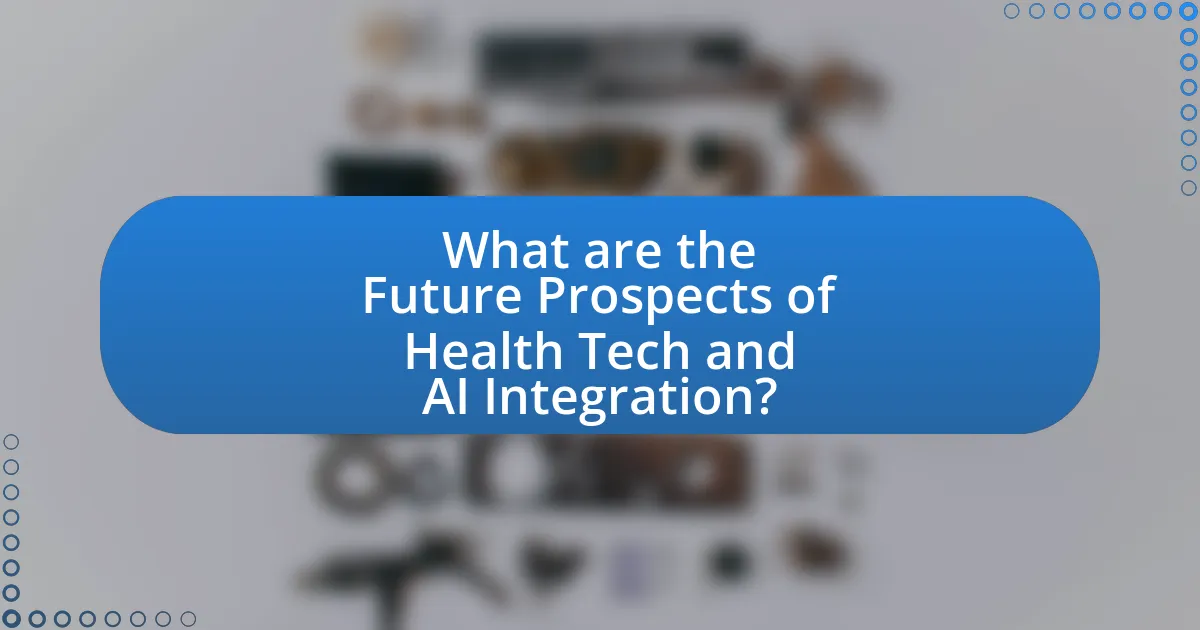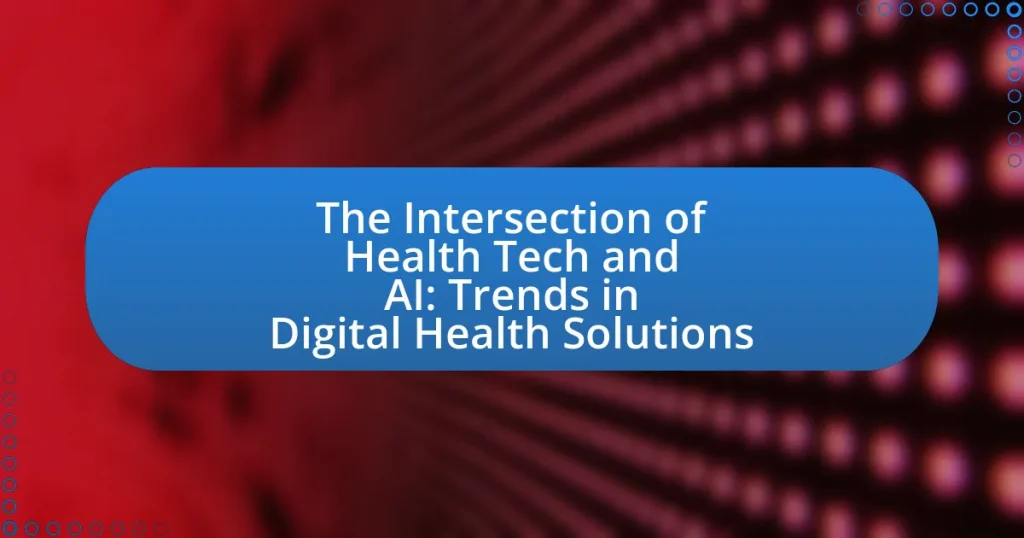The article focuses on the intersection of health technology and artificial intelligence (AI), highlighting how their integration enhances patient care, operational efficiency, and health outcomes. It discusses the collaboration between health tech and AI, detailing the technologies involved, such as machine learning, telemedicine, and wearable devices, and their impact on personalized medicine and predictive analytics. Additionally, the article addresses current trends in digital health solutions, the evolution of telemedicine with AI, and the future prospects of AI in healthcare delivery, emphasizing the importance of ethical practices and strategies for successful AI adoption in the healthcare sector.

What is the Intersection of Health Tech and AI?
The intersection of health tech and AI refers to the integration of artificial intelligence technologies within healthcare systems to enhance patient care, streamline operations, and improve health outcomes. This integration enables predictive analytics for disease diagnosis, personalized treatment plans, and efficient management of healthcare resources. For instance, AI algorithms can analyze vast amounts of medical data to identify patterns that assist in early disease detection, as evidenced by studies showing AI’s accuracy in diagnosing conditions like diabetic retinopathy and skin cancer. Furthermore, AI-driven tools such as chatbots and virtual health assistants are increasingly used to provide patient support and triage, demonstrating the practical applications of AI in improving healthcare delivery.
How do Health Tech and AI collaborate to enhance healthcare?
Health Tech and AI collaborate to enhance healthcare by integrating advanced algorithms and data analytics into medical devices and software applications. This collaboration enables real-time patient monitoring, predictive analytics for disease prevention, and personalized treatment plans. For instance, AI algorithms can analyze vast amounts of patient data to identify patterns and predict health outcomes, leading to improved decision-making by healthcare providers. A study published in the Journal of Medical Internet Research found that AI-driven tools can reduce diagnostic errors by up to 30%, demonstrating the effectiveness of this collaboration in improving patient care and outcomes.
What technologies are involved in this intersection?
The technologies involved in the intersection of health tech and AI include machine learning algorithms, natural language processing, telemedicine platforms, wearable health devices, and electronic health records. Machine learning algorithms analyze vast amounts of health data to identify patterns and predict outcomes, while natural language processing enables the interpretation of unstructured data from clinical notes and patient interactions. Telemedicine platforms facilitate remote consultations, enhancing access to healthcare services. Wearable health devices, such as fitness trackers and smartwatches, collect real-time health metrics, contributing to personalized health management. Electronic health records streamline patient information management, allowing for better data integration and analysis. These technologies collectively enhance patient care, improve operational efficiency, and drive innovation in digital health solutions.
How do these technologies improve patient outcomes?
Technologies such as artificial intelligence, telemedicine, and wearable health devices improve patient outcomes by enhancing diagnostic accuracy, facilitating timely interventions, and promoting personalized care. For instance, AI algorithms can analyze medical data to identify patterns that lead to earlier detection of diseases, which has been shown to reduce mortality rates in conditions like cancer. Telemedicine allows for remote consultations, increasing access to healthcare services, particularly in underserved areas, thereby improving treatment adherence and patient satisfaction. Wearable devices enable continuous monitoring of vital signs, empowering patients to manage chronic conditions more effectively, which has been linked to better health management and reduced hospitalizations.
Why is the integration of AI in Health Tech important?
The integration of AI in Health Tech is important because it enhances diagnostic accuracy and improves patient outcomes. AI algorithms can analyze vast amounts of medical data, leading to more precise diagnoses; for instance, studies show that AI can outperform human radiologists in detecting certain cancers, achieving accuracy rates above 90%. Additionally, AI-driven tools facilitate personalized treatment plans by analyzing individual patient data, which can lead to better management of chronic diseases. The World Health Organization has noted that AI can significantly reduce healthcare costs by streamlining operations and improving efficiency, making it a crucial component in the evolution of healthcare systems.
What challenges does AI address in the healthcare sector?
AI addresses several challenges in the healthcare sector, including diagnostic accuracy, patient data management, and operational efficiency. For instance, AI algorithms can analyze medical images with a reported accuracy of up to 94%, significantly improving the detection of conditions like cancer compared to traditional methods. Additionally, AI enhances patient data management by automating the organization and analysis of vast amounts of health records, which can reduce administrative burdens by up to 30%. Furthermore, AI-driven tools streamline operational processes, leading to reduced wait times and improved patient outcomes, as evidenced by a study showing that AI implementation in hospitals can decrease patient discharge times by 20%.
How does AI contribute to personalized medicine?
AI contributes to personalized medicine by analyzing vast amounts of patient data to tailor treatments and interventions to individual needs. Machine learning algorithms can identify patterns in genetic, environmental, and lifestyle factors, enabling healthcare providers to predict disease susceptibility and treatment responses. For instance, AI-driven tools like IBM Watson have demonstrated the ability to analyze clinical data and genomic information, leading to more accurate diagnoses and personalized treatment plans. This approach enhances patient outcomes by ensuring that therapies are specifically suited to the unique characteristics of each patient, as evidenced by studies showing improved efficacy in targeted therapies for conditions like cancer.

What are the Current Trends in Digital Health Solutions?
Current trends in digital health solutions include the increased use of telemedicine, the integration of artificial intelligence for diagnostics and personalized treatment, and the rise of wearable health technology. Telemedicine has expanded significantly, with a report from McKinsey indicating that telehealth utilization has stabilized at levels 38 times higher than before the pandemic. AI is being leveraged to analyze vast amounts of health data, improving diagnostic accuracy and treatment plans, as evidenced by studies showing AI algorithms outperforming human clinicians in specific diagnostic tasks. Additionally, wearable devices are gaining popularity, with a Statista report projecting that the global market for wearable health technology will reach $60 billion by 2023, reflecting a growing consumer demand for real-time health monitoring.
How is telemedicine evolving with AI technologies?
Telemedicine is evolving with AI technologies by enhancing diagnostic accuracy, personalizing patient care, and streamlining administrative processes. AI algorithms analyze vast amounts of patient data, enabling healthcare providers to identify patterns and predict health outcomes more effectively. For instance, a study published in the Journal of Medical Internet Research found that AI-driven tools can improve diagnostic accuracy by up to 20% in certain conditions, such as dermatological issues. Additionally, AI chatbots and virtual assistants facilitate patient interactions, reducing wait times and improving access to care. This integration of AI not only optimizes telemedicine services but also supports healthcare professionals in delivering timely and efficient care.
What role does AI play in remote patient monitoring?
AI plays a crucial role in remote patient monitoring by enabling real-time data analysis and personalized healthcare interventions. Through machine learning algorithms, AI can process vast amounts of patient data collected from wearable devices and health apps, identifying patterns and predicting potential health issues. For instance, a study published in the Journal of Medical Internet Research found that AI-driven monitoring systems improved chronic disease management by 30%, demonstrating the effectiveness of AI in enhancing patient outcomes.
How does AI enhance the telehealth experience for patients?
AI enhances the telehealth experience for patients by providing personalized care, improving diagnostic accuracy, and facilitating efficient communication. Through machine learning algorithms, AI analyzes patient data to tailor treatment plans, ensuring that care is specific to individual needs. For instance, AI-driven chatbots can offer 24/7 support, answering patient queries and scheduling appointments, which significantly reduces wait times and enhances accessibility. Additionally, studies show that AI can improve diagnostic accuracy by up to 20% in certain conditions, leading to better health outcomes. This integration of AI in telehealth not only streamlines processes but also empowers patients with timely and relevant information, ultimately enhancing their overall healthcare experience.
What innovations are emerging in health data analytics?
Innovations emerging in health data analytics include the use of artificial intelligence (AI) and machine learning algorithms to enhance predictive analytics, improve patient outcomes, and streamline operations. AI-driven tools can analyze vast amounts of health data to identify patterns and trends, enabling healthcare providers to make data-informed decisions. For instance, a study published in the Journal of Medical Internet Research in 2021 demonstrated that machine learning models could predict hospital readmissions with an accuracy of over 80%, showcasing the potential of these technologies in improving patient care. Additionally, real-time data integration from wearable devices and electronic health records (EHRs) is facilitating personalized medicine, allowing for tailored treatment plans based on individual patient data.
How does AI improve predictive analytics in healthcare?
AI enhances predictive analytics in healthcare by analyzing vast amounts of patient data to identify patterns and predict outcomes. This capability allows healthcare providers to anticipate disease progression, optimize treatment plans, and improve patient management. For instance, AI algorithms can process electronic health records, genetic information, and social determinants of health to forecast hospital readmissions with up to 80% accuracy, as demonstrated in studies published in journals like the Journal of Medical Internet Research. By leveraging machine learning techniques, AI continuously improves its predictive models, leading to more personalized and effective healthcare solutions.
What are the implications of real-time data processing in health tech?
Real-time data processing in health tech significantly enhances patient care and operational efficiency. By enabling immediate access to patient data, healthcare providers can make timely decisions, leading to improved diagnosis and treatment outcomes. For instance, real-time monitoring of vital signs allows for rapid intervention in critical situations, reducing the risk of complications. Additionally, real-time analytics can optimize resource allocation and streamline workflows, ultimately lowering healthcare costs. According to a study published in the Journal of Medical Internet Research, real-time data processing can reduce hospital readmission rates by up to 20%, demonstrating its effectiveness in improving patient management and healthcare delivery.

What are the Future Prospects of Health Tech and AI Integration?
The future prospects of health tech and AI integration are highly promising, with advancements expected to enhance patient care, streamline operations, and improve diagnostic accuracy. According to a report by Accenture, AI applications in healthcare could create $150 billion in annual savings for the US healthcare system by 2026, demonstrating the significant economic impact of this integration. Furthermore, AI-driven tools are anticipated to facilitate personalized medicine, enabling tailored treatment plans based on individual patient data, which can lead to better health outcomes. As telemedicine and remote monitoring technologies evolve, the synergy between health tech and AI will likely lead to more efficient healthcare delivery and improved patient engagement.
How might AI shape the future of healthcare delivery?
AI will significantly shape the future of healthcare delivery by enhancing diagnostic accuracy, personalizing treatment plans, and streamlining administrative processes. For instance, AI algorithms can analyze medical images with a diagnostic accuracy of up to 94%, as demonstrated in studies published in journals like Nature and The Lancet. Additionally, AI-driven tools can process vast amounts of patient data to identify patterns and predict health outcomes, leading to tailored treatment strategies that improve patient care. Furthermore, AI can automate routine administrative tasks, reducing the burden on healthcare professionals and allowing them to focus more on patient interaction, which is crucial for improving overall healthcare efficiency.
What potential advancements can we expect in AI-driven diagnostics?
AI-driven diagnostics are expected to advance significantly through enhanced accuracy, speed, and personalization in disease detection and management. These advancements will likely stem from improved algorithms that analyze vast datasets, including medical imaging and patient records, leading to more precise diagnoses. For instance, studies have shown that AI can outperform human radiologists in identifying certain conditions, such as breast cancer, with accuracy rates exceeding 94%. Additionally, the integration of AI with wearable technology will enable real-time monitoring and predictive analytics, allowing for proactive healthcare interventions. As AI continues to evolve, its ability to learn from new data will further refine diagnostic capabilities, ultimately improving patient outcomes and reducing healthcare costs.
How could AI influence healthcare policy and regulation?
AI could significantly influence healthcare policy and regulation by enabling data-driven decision-making and improving patient outcomes. For instance, AI algorithms can analyze vast amounts of health data to identify trends, predict outbreaks, and optimize resource allocation, which can inform policy changes. A study published in the Journal of Medical Internet Research found that AI applications in healthcare can lead to a 30% reduction in hospital readmissions, demonstrating the potential for AI to shape regulations aimed at improving care quality and efficiency. Additionally, AI can assist in ensuring compliance with regulations by automating reporting processes and monitoring adherence to standards, thereby enhancing accountability in healthcare systems.
What best practices should be followed for implementing AI in Health Tech?
Best practices for implementing AI in Health Tech include ensuring data privacy and security, validating algorithms with clinical data, fostering interdisciplinary collaboration, and maintaining regulatory compliance. Data privacy and security are critical due to the sensitive nature of health information; for instance, adherence to HIPAA regulations is essential in the U.S. Validating algorithms with clinical data ensures that AI systems provide accurate and reliable outcomes, as evidenced by studies showing that AI models trained on diverse datasets perform better in real-world applications. Interdisciplinary collaboration among healthcare professionals, data scientists, and IT experts enhances the development and deployment of effective AI solutions. Lastly, maintaining regulatory compliance with health authorities ensures that AI technologies meet safety and efficacy standards, which is vital for gaining trust from both providers and patients.
How can healthcare organizations ensure ethical AI usage?
Healthcare organizations can ensure ethical AI usage by implementing robust governance frameworks that prioritize transparency, accountability, and fairness in AI systems. These frameworks should include guidelines for data privacy, informed consent, and bias mitigation, ensuring that AI applications do not perpetuate existing inequalities. For instance, the World Health Organization emphasizes the importance of ethical guidelines in AI deployment, highlighting that adherence to ethical standards can enhance trust and improve patient outcomes. By regularly auditing AI systems and involving diverse stakeholders in the development process, healthcare organizations can further reinforce ethical practices and align AI technologies with patient-centered care.
What strategies can enhance the adoption of AI technologies in healthcare?
To enhance the adoption of AI technologies in healthcare, organizations should implement comprehensive training programs for healthcare professionals. These programs can increase familiarity with AI tools, leading to greater acceptance and effective utilization. Research indicates that 70% of healthcare professionals feel unprepared to use AI technologies, highlighting the need for targeted education and training initiatives. Additionally, fostering collaboration between AI developers and healthcare providers can ensure that AI solutions are tailored to meet clinical needs, thereby improving integration into existing workflows. Evidence from successful implementations shows that such collaborative approaches can lead to a 30% increase in the efficiency of healthcare delivery.


